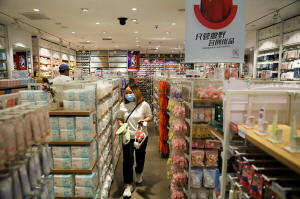China's discount wars risk cementing frugal consumer mindset
 Send a link to a friend
Send a link to a friend
 [June 11, 2024] By
Casey Hall [June 11, 2024] By
Casey Hall
SHANGHAI (Reuters) - An aggressive market grab by low-cost Chinese
retailers has delivered bumper earnings for some firms but has also
intensified a bruising price war, exacerbating deflationary fears in the
world's second-largest economy.
From coffee to cars to clothes, China's discount retailers have cut
prices on just about everything as they chase a consumer whose
confidence has been battered by a property crisis, high unemployment and
a gloomy economic outlook.
While the retail downshift has propelled revenues for firms like
discount e-commerce platform Pinduoduo against larger rivals such as
Alibaba, economists fear their success is entrenching a Japanese-style
deflationary mindset in the consumer that will be difficult to shake.
As retailers compete on price above all else, they force tough cost cuts
onto their suppliers, squeezing profit margins. This in turn leads to
lower wage growth or higher dependency on low-paid gig work, hurting
household demand.
"If this situation continues, China may end up with what we call a
vicious cycle: lower value added consumption, deflation, low profit
rates leading to low wages, which further pushes consumers to downgrade
their consumption," said He-Ling Shi, an economics professor at Monash
University in Melbourne.
In the most recent earnings season, revenues for low-cost firms beat
market expectations and outpaced their competitors.

Revenues of PDD Holdings, which owns Pinduoduo, surged 131% while
China's leading food delivery app Meituan saw 25% growth. Discount
retailer Miniso and Luckin Coffee reported growth of 26% for 42%,
respectively.
PDD, Meituan, Miniso and Luckin Coffee did not immediately respond to
requests for comment.
China's consumer price data for May due on Wednesday is expected to show
a slight uptick in inflation to 0.4% from 0.3% April.
However, analysts expect the headline figures will mostly be propped up
by utility price hikes, masking more critical deflationary pressures.
RACE TO THE BOTTOM
In an environment where consumer confidence is near rock bottom, price
is king.
Car makers in China have been in a price war for almost two years due to
tepid domestic demand. Over the past two months, some car dealers and
auto financing firms have launched loan programs with no down payment
and even zero interest.
[to top of second column] |

A customer shops at a store of Chinese retailer MINISO Group in
Beijing, China September 13, 2021. Picture taken September 13, 2021.
REUTERS/Tingshu Wang/File Photo

Starbucks, which saw its China revenues decline 8% in the first
quarter due to what CEO Laxman Narasimhan described as "fierce
competition among value players" has in recent months increased its
use of discount coupons to bring prices closer to Luckin Coffee.
CEO of food delivery giant Meituan, Wang Xing, said last week the
firm had expanded coupon offerings and onboarded more delivery-only
kitchens with lower overheads than dine-in restaurants. The app's
newer hotel booking business is pursuing what Wang called a "low
star" strategy targeting cost-conscious domestic travellers.
Alibaba's domestic e-commerce unit Taobao and Tmall Group and JD.com,
which saw single-digit revenue growth, said in post-earnings calls
that price competitiveness will be key to future growth.
Both companies have introduced longer sales periods for China's
mid-year shopping festival, known as "618", with lowest-price
guarantees for millions of products. In response, Pinduoduo has
launched an "automated price-tracking system" to enable merchants to
monitor and beat rivals.
An internal memo to staff sent by JD.com founder Richard Liu
describing his firm as "bloated" has led to speculation the company
will respond to the increased competition by cutting jobs - which is
the opposite of what China needs for domestic demand to recover.
Longer-term, price wars may take out weaker players in various
industries, allowing rivals to then lift prices and give their
supply chains some respite, said Albert Hu, professor of economics
at the China Europe International Business School in Shanghai.
He warned, however, that they would only be able to do so if growth
in other industries creates enough jobs and income growth to
compensate for any market exits triggered by price wars in consumer
goods.
"Deflation is a serious issue, Japan has struggled with it for over
three decades," said Hu. "A critical factor is wage growth."
(Reporting by Casey Hall; Editing by Marius Zaharia and Sam Holmes)
[© 2024 Thomson Reuters. All rights
reserved.]
This material may not be published,
broadcast, rewritten or redistributed.
Thompson Reuters is solely responsible for this content.
 |